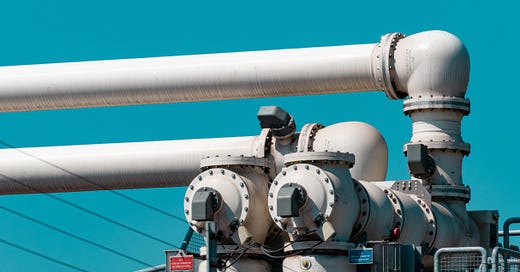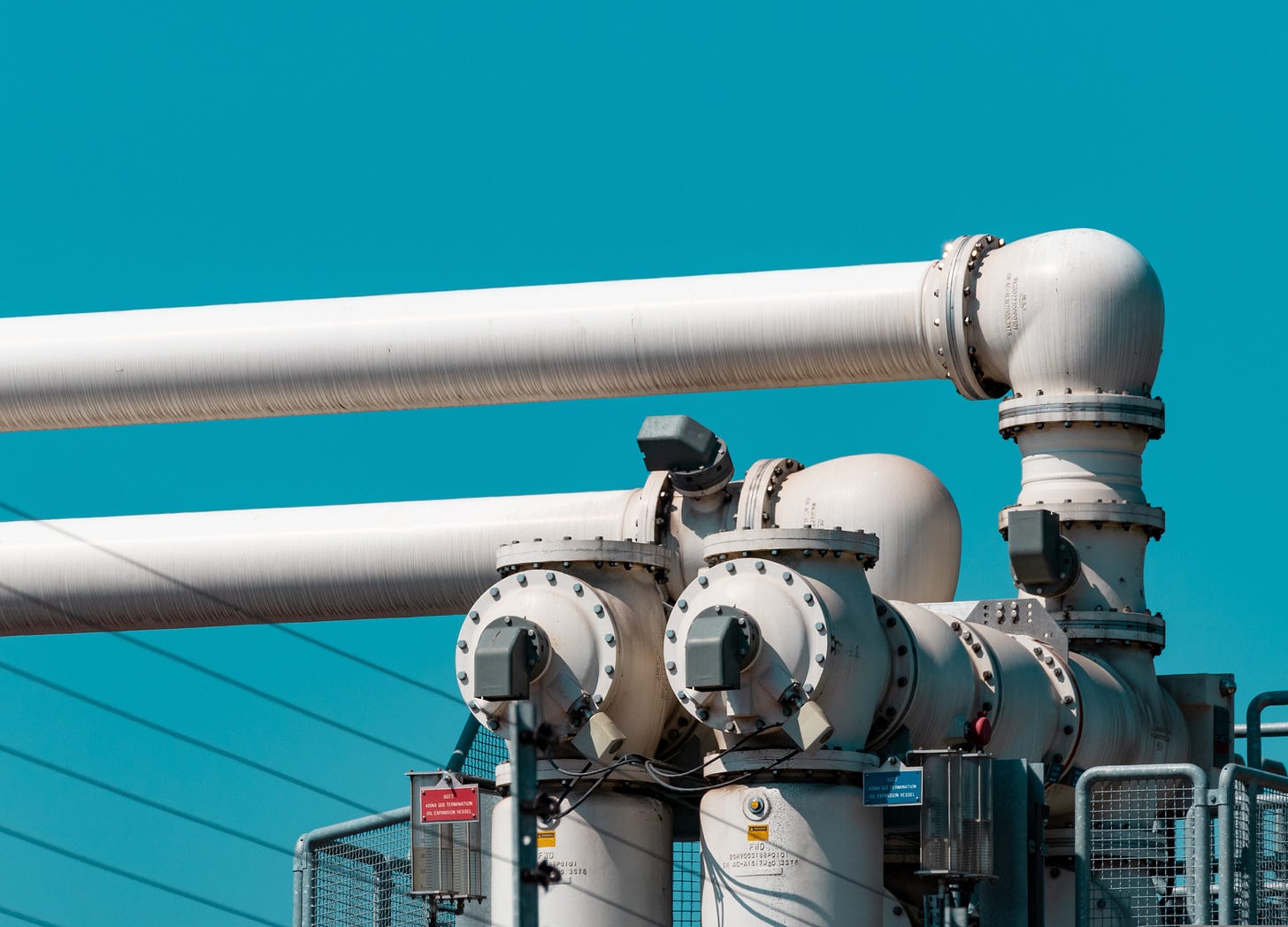Thank you for reading The Hundred, a newsletter in which experts provide analysis on questions that matter. Subscribe below to support the project.
Hanns Koenig is Head of Commissioned Projects Central Europe at Aurora Energy Research. As an expert on European power and gas markets, he advises utilities, investors, corporates and political decision-makers. Our questions are in bold, his answers in quotation marks.
What did Germany’s energy mix look like before February?
“In 2021, Germany received roughly a third of its primary energy from oil, a quarter from gas, a fifth from coal, and the remainder from renewables and nuclear. About half of gas is used in space heating, a third in industry and the remainder in power generation. More than half of German gas used to come from Russia.”
What were the advantages of buying natural gas from Russia?
“Russian gas has been attractive to Europe for three main reasons: i) its cost – Russia has the lowest cost of producing natural gas in Europe’s vicinity, ii) its scale – Russia has enormous resources, iii) its connection to Europe – pipelines through Ukraine, Poland, the Baltic Sea and Turkey offer large import capacity. In addition there was a political dimension: for many in Europe, especially in Germany, building the “Gas Bridge” was seen as a means of creating mutual interdependence and hence incentives to collaborate and maintain peace in Europe; importing gas was even seen as a way of fostering modernisation and democratisation in Russia, as summarised in the German dictum of “Wandel durch Handel” (transformation through trade). Success of the latter was obviously mixed, to say the least.”
How damaging would a total stop of Russian gas imports have been in March?
“A range of studies projected a negative short-term impact between 2 and 10% of GDP, because some industrial production would have to be switched off to reduce gas consumption. I am not in the business of macro modelling, but would consider an outcome on the lower end of the spectrum more likely, because substitution of some gas in industry is possible, and in fact already happening, and the government can take countermeasures, such as furlough schemes for workers, to counter the effects.”
How much more will ordinary Germans have to pay to heat their homes this winter?
“Gas consumption of a typical household is 10 Megawatt hours (MWh) per year. Utilities are likely to increase prices by 100 EUR/MWh or more for the winter, which would translate into an additional burden of 1000 EUR per household over the next year. On top of that, expensive gas also means that electricity gets more expensive, which creates an additional challenge for households.”
What incentive does Moscow have not to cut gas supplies altogether?
“Over the past months, Russia has very effectively used its monopoly power in the European gas market: as Russia decreases flows, gas prices increase. Concretely, Russian flows into Europe in recent weeks have been approximately one third of usual levels, but the European gas price has been more than ten times as high, so Russia’s revenues have still been more than three time above usual levels. However, that kind of strategy has its limits: cutting flows to zero of course means no more revenues for Russia. I believe that it is for this reason that Russia has systematically and gradually squeezed the market since last fall, but not cut flows completely yet.”
What measures has the German government taken to try to mitigate the risks?
“The German government is taking steps on both the demand and the supply side: to reduce demand, the government has brought back to the market old coal and oil power plants to displace gas power plants, is in the process of introducing an auction scheme to incentivise industrial demand reductions and is calling on households and commercial consumers to save gas and power. On the supply side, Germany has ordered four floating LNG terminals, which will be delivered from this winter onwards. The government has also increased payments to financially vulnerable households to lower the impact on them. Unfortunately, the government has also taken some less than helpful steps, for instance creating a subsidy scheme for industry that decreases effective gas prices and hence the incentive to save gas, which we absolutely need to do over the next winter.”
Could a delay of Germany’s exit from nuclear power help?
“It would not be a game changer, but it could help save gas, because a lot of incremental power generation comes from gas power plants. The situation is made worse by the crisis in the French nuclear fleet, where only half of the installed reactor capacity is currently available due to maintenance and faults. This means that extending German nuclear closures at least by the end of the next winter could contribute to relaxing the situation in the power and gas markets.”
There has been a lot of talk about price caps. What is that all about?
“There are two ways in which gas price caps can work: on the one hand, they lower the gas price paid by consumers, reducing the burden on households and industry directly. However, lower prices would likely reduce the amount of LNG Europe can attract in the global markets, as well as reducing incentives to save gas, and could thus make the overall crisis worse by requiring more consumers to be switched off over the next winter. On the other hand, gas price caps have an effect on the power market, where gas power plants frequently set the price. Lower gas prices hence lead to lower power prices; the Spanish government has introduced such a policy recently; the downsides of it are similar to those of the direct effects of the gas price cap: there are lower incentives to save power in a time when we absolutely need to.”
To what extent can Europeans help each other?
“The European gas and electricity grids are closely linked, and European cooperation is essential to get through the next winter. If Russian flows stop completely, those European countries that are landlocked and/or do not have LNG terminals will require imports from those countries that do have access to non-European sources to get through the winter. In that regard, announcements such as that of Hungary recently, which intends to implement an export ban on natural gas and coal, are extremely dangerous. However, there are limits to what individual European countries can do: Spain, for instance, has more than sufficient LNG import capacities to meet its own demand, but is insufficiently connected to the rest of Europe to export all the gas it can import, making gas saving on the Iberian peninsula less effective than in the rest of Europe.”
What is a question you wish you were asked and what is your answer to it?
“Is a change in the European power market design needed in response to the energy price crisis?
There are currently a lot of calls to reform the European power price design in order to decouple power prices from gas prices. Such proposals are, in my view, dangerous: power is usually priced by the most expensive power plant required to produce the required amount of electricity in any given hour. When this power plant is a very expensive one, for instance because it runs on gas and gas prices are high, this means the power price is very high. However, the high price reflects real economic scarcity, and creates an incentive for consumers, especially in industry, to reduce power consumption. Artificially reducing the price of power seen by industry leads them to save less power, increasing consumption and making the crisis worse. Ad hoc changes to the power market design would likely also affect investor confidence and raise the risk premia applied to financing cost of new investments in power generation capacities.”
That’s it for The Hundred #24. Please share this post with friends and colleagues if you found it interesting. Subscribe below to support the project.






